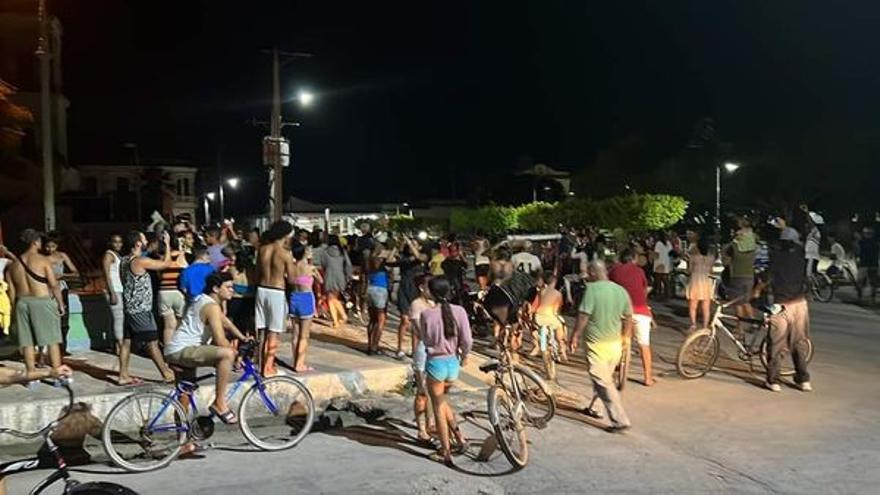
![]() 14ymedio, Havana, 4 August 2023 — The Cuban Conflict Observatory (OCC) registered a total of 589 protests on the island in July. The figure, which represents an increase of 124% compared to the same month of the previous year, exceeded by 175 incidents than those counted in June of 2022. Except for the months of October (with 589 protests) and December (with 692 protests) in 2022, this month has been the month with the highest rate of public demonstrations reported by the platform since 2021.
14ymedio, Havana, 4 August 2023 — The Cuban Conflict Observatory (OCC) registered a total of 589 protests on the island in July. The figure, which represents an increase of 124% compared to the same month of the previous year, exceeded by 175 incidents than those counted in June of 2022. Except for the months of October (with 589 protests) and December (with 692 protests) in 2022, this month has been the month with the highest rate of public demonstrations reported by the platform since 2021.
Havana was designated as the most active territory in the country, with 216 protests, 44 more than in June. However, the OCC warned that the rates of protest had increased throughout the country, including the Isle of Youth. This pattern had already been generated in the report for the month of June, when the document reported that the presence of “expressions of protest” throughout the Island constituted a sign of general disagreement with the state administration.
Other territories with high numbers were Holguín, with 36 cases, Guantánamo, with 27, and Santiago de Cuba, with 26. All of them belong to the eastern part of the country, a region that has been presented by its inhabitants as the most abandoned by the Government and the institutions.
Of the almost 600 events, 327 (55.5%) were linked to civil and political rights, with a predominance related to cases of repression (146) against political prisoners, influencers, opponents, activists, independent journalists and ordinary citizens. Of these protests, 143 were direct challenges to the repressive authorities, which achieved that for “for the first time,” according to the platform, that this indicator was “remarkably close to that of protests for repressive acts.”
Some of the cases referred to by the Observatory were the suspension of visits to the political prisoner Maykel Castillo Osorbo in the Kilo 5 y Medio prison, the disclosure of personal calls by the independent journalist Camila Acosta on Cuban Television and the dismantling of a protest of 20 women who tried to demonstrate in the Plaza de la Revolución to demand milk for their children.
In the same category, some 46 protests involved graphic media such as memes, videos, graffiti or photographs.
Regarding economic and social rights, the demonstrations due to citizen insecurity numbered (74), disagreement with public services (68), lack of food (41), deterioration of the public health system (40), homelessness ( 31) and housing problems (10). The total number of events held for these reasons was 262 demonstrations, 43.9% of the total.
As quantified by the OCC, protests related to civil rights exceeded those calling for economic improvements by 11% this July. The previous month, however, the population reacted 10% more to violations of economic rights than to civil rights.
The report includes the “direct criticism” of some figures in the Cuban intellectual sphere, such as the economist Pedro Monreal, the comedians Ulises Toirac and Rigoberto Ferrera, and the writer Leonardo Padura, who “vented their anger after being affected by the multiple aspects of the general crisis.”
Other protests that had great visibility were the sit-in by a dozen residents of Central Havana who had been deprived of electricity and water for days, the confrontation between the Assembly of Filmmakers and officials during their meeting at the Chaplin Cinema, and the cacerolazo [protests by banging on pots and pans] during a blackout in the capital’s municipality of Diez de Octubre.
For its part, the Cubalex platform recently published a report on violations of criminal protection rights by the island’s courts since 1959.
The organization claims to have registered at least 767 cases of people sanctioned for political reasons in the last 64 years. With the testimonies, Cubalex explains that it has been able “to frame especially the stage from 1959 to 1979 to delve into the political and judicial procedure of the Cuban State regarding the history of discrimination for political reasons, the persecution of people for cataloged political crimes as counterrevolutionaries and the classification of the so-called ’crimes against State Security’.”
In turn, the organization denounces the progressive closure of legal channels that allow criminal protection from the Government of Fulgencio Batista to the present. The current Constitution, it points out, “cannot be reformed by popular initiative” either, since “it declares any action taken against the socialist system illegal, and authorizes the use of any means, including armed struggle, against whoever tries to modify that system.”
The platform warns that the results presented are partial and ensures that it is working on the individual analysis of each case, as well as on the evolution of the constitutions and criminal laws that were in force in the period, including the current Constitution.
____________
COLLABORATE WITH OUR WORK: The 14ymedio team is committed to practicing serious journalism that reflects Cuba’s reality in all its depth. Thank you for joining us on this long journey. We invite you to continue supporting us by becoming a member of 14ymedio now. Together we can continue transforming journalism in Cuba.
